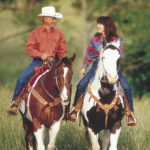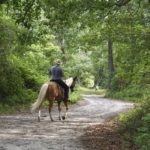You woke up this morning with every intention of riding after work. The prospect of a relaxing, horse-filled evening at the barn helped to motivate you through your busy schedule. Then your day spun out of control: A co-worker went home sick, leaving you with her share of the workload; your boss gave you an assignment she needed yesterday; and your husband called to say he couldn?t pick up the kids, and by the way, could you ple-e-e-a-se bake something special tonight for his boss? birthday bash? Your head and heart pound, and you sigh as you realize that something has to give. As usual, you determine that ?something? is your horse.
Sound familiar? Welcome to today?s world! Some of us ride for goal-oriented achievement, some of us ride for relaxation, but we all face the challenge of creating in-the-saddle time. So how can you fit it in your everything?s-a-priority schedule?
We’re going to give you 20 simple solutions, many of which have helped those of us here at H&R to fit our horses into hectic schedules. Apply them to your unique situation, and be creative in devising your own riding program. (If you have some time-saving ideas of your own, please send them in and share them with us!)
1. Make riding a priority. When you leave your riding time as an option for time usage, you’ll rarely find time to ride. If you don’t let your family and fellow employees know that your riding time is a priority, they won?t treat it as one?and won?t hesitate to infringe upon it!
2. Establish?and adhere to?a riding schedule. Let?s say you plan to ride after work three nights a week. Let your family and friends know you’re available before and after those sessions, but that you’re riding time is off limits. You?ll soon find that when you take your riding commitment seriously, those around you will do the same.
3. Rethink your daily schedule. To free up time to ride, wake up an hour earlier in the morning. (Doing so may be hard at first, but your body will quickly adapt.) Use that time to get a jump on your daily chores, or head into work early, so you can get a head start on the day?s projects.
4. Negotiate with family and friends. Trade favors for riding time. For instance, play ?let?s make a deal? with your spouse. ?Honey, if you’ll watch the kids for a couple hours, three days a week, I’ll take over on the weekends, so you can golf/fish/play poker.? Tell a friend you’ll watch her kids for a few hours over the weekend, if she’ll watch yours one night after work.
5. Ride at dawn. If you’re a morning person, ride in the day?s first light. The advantages include cool, calm air; an almost insect-free environment; minimal barn crowds (a big plus if you board at a busy stable); and the satisfaction of knowing you?ve done your riding no matter what else your day brings. (For many riders, simply avoiding the worry that something unexpected will nix a ride makes the early get-up tolerable!)
6. Ride after dark. Doing so will rid you of each day?s fixed anxiety about having time to squeeze in a pre-sundown ride. To do so, you can add arena lights to your facility setup, trailer to a lighted arena one or two nights a week, or take advantage of the night-riding safety gear available, including reflective, glow-in-the-dark leg wraps; reflective vets; and ?tail-lights? that attach to your belt. (Tip: If you keep your horse at home, improve your barn and yard lighting so you brighten up the atmosphere, making after-hours barn treks less dark and dreary.)
7. Plan quick, easy dinners. Get up early enough to throw dinner in the slow cooker, so your family can eat as soon as you arrive home from an after-work ride. Pre-cut salad or deli-tray fixings on a non-ride night, then pull them out on ride nights to create a fix-your-own salad or sandwich bar. Make an extra main dish or two on Sunday, and then freeze for use later in the week. And don’t shy away from the occasional fast-food meal.
8. Explore flex-time options at work. Ask your supervisor if you can come in half an hour early, or leave half an hour late, in order to get an extra 30 minutes at lunch time for riding. If lunch-time rides aren?t an option, ask if you can work through a half hour of your lunch period, so you can leave work a half hour early.
9. Minimize your training time. Don?t feel that every ride must be an hour long. If you can only squeeze in a 15- or 20-minute after-work session, do it. You can spend more time in the saddle on the weekend.
10. Use the buddy system. Trade off horse responsibilities with family members or just-as-busy barn buddies. On days you can’t get to the barn, ask your buddy to groom and longe/turn out your horse, doing the same for him or her.
11. Half-lease your horse. If you only can ride three times a week, half-lease your horse. Find someone who?s trustworthy, and who?s at a similar proficiency level. Charge half your monthly board and expenses for the privilege of riding your horse three days a week, according to an agreed-upon schedule. You?ll not only shed your I-can’t-get-to-the-barn guilt, but you’ll also save some money!
12. Get help. Hire help for the time-gobbling daily/weekly chores. Since your goal is to find time blocks for riding?which translates into hours?think about what takes those blocks away from your day, then wrangle a way for someone else to handle them. For instance, bring your lunch to work every day, and apply the money you save toward hiring a twice-a-month house-cleaning service.
13. Triage. Analyze chores to see what could be eliminated, or could be handled on a less regular basis. Example: Get your kids to fold and put away their own laundry, so you can go to the barn!
14. Make your riding time quality time. Since you have limited time to ride, minimize those gabs with your barn buddies, which eat up valuable time. Use your warm-ups and cool-downs to accomplish something. For instance, incorporate simple flexibility exercises in your warm-up/cool-down routines.
15. ?Ride? even when you can’t. Perform riding-specific exercises and visualization techniques when you can’t get to the barn. Doing so will improve your in-the-saddle time, by working riding-specific muscles, and by preparing you mentally for your next ride. Watch training videos, and read horse books and magazines on your off days, so you’ll have something to work toward when you get back in the saddle.
16. Take days off. If you have to skip two or three days of riding, don’t get discouraged. Instead, use this to your advantage by planning a more intense, high-quality riding session before or after. Then, instead of feeling bad about not riding, you can feel good, knowing that you made the best of a less-than-ideal situation.
17. Plan. Use these tips to safeguard precious time: (A) if you realize your tack needs repair, immediately attend to it, so you won?t delay your next ride; (B) if you must go from work to the barn, bring in a week?s worth of riding clothes at a time, so you eliminate the ?I forgot my clothes? excuse; (C) always keep your tack and grooming equipment easily accessible, so you don’t waste precious time digging around for a needed item; and (D) establish a routine, so everything surrounding each ride is streamlined and efficient.
18. Set goals. When you have the date of an important ride or competition circled on your calendar, you’ll find it easy to motivate yourself to find riding opportunities. As the crucial day nears, you can justify arranging other parts of your life around your horse for a change?you?ve earned it with your dedication. Afterward, reduce your riding time, to take care of aspects of your life you might have ignored, then identify another goal to build toward.
19. Give your horse life a jumpstart. Maybe you’re using your ?no time to ride? excuse to avoid a sad reality?maybe you don’t want to ride. Analyze your horse life. Are you bored with your same old routine? If so, a change might be just what you need. Idea: Try a lesson or clinic in a horse sport that’s new to you. It could provide just the spark you need.
20. Keep it fun. When time-pressures intensify, it’s easy to think of your horse as one more chore to attend to. Banish that thought! Remember why you got into riding in the first place?for fun and enjoyment! Thousands of horseless folks would gladly trade places with you, even on your most hectic day. Sometimes, the best antidote to an overwhelmed day is some ?carrot time? with your equine compadre. n





